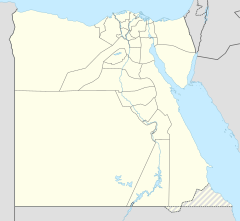Manial Palace and Museum
You can help expand this article with text translated from the corresponding article in Arabic. (April 2019) Click [show] for important translation instructions.
|
| Manial Palace | |
|---|---|
 | |
| General information | |
| Architectural style | Arabic, Ottoman, Moorish |
| Town or city | Manial Cairo |
| Country | |
| Coordinates | 30°01′39″N 31°13′47″E / 30.0274°N 31.2298°E |
| Construction started | 1875 |
| Client | Mohammed Ali Tewfik |


The Manial Palace and Museum is a former Alawiyya dynasty era palace and grounds on Rhoda Island on the Nile. It is of Ottoman architecture and located in the Sharia Al-Saray area in the El-Manial district of southern Cairo, Egypt. The palace and estate has been preserved as an Antiquities Council directed historic house museum and estate, reflecting the settings and lifestyle of the late 19th- and early 20th-century Egyptian royal prince and heir apparent. The residence compound, composed of five separate and distinctively styled buildings, is surrounded by Persian gardens within an extensive English Landscape garden estate park, along a small branch of the Nile.
History
[edit]The Manial Palace was built by Prince Mohammed Ali Tewfik[1] (1875—1955), the uncle of King Farouk, between 1899 and 1929. He had it designed in a style integrating European Art Nouveau and Rococo[2] with many traditional Islamic architecture styles including Cairine Mamluk, Arab Andalusian Revival, Persian, European creating inspired combinations in spatial design, architectural and interior decorations, and sumptuous materials.[citation needed] It housed his extensive art, furniture, clothing, silver and art objects collections, and medieval manuscripts[3] dating back to the Middle Ages. The ceramic tile work of the entryway and the mosque were created by the Armenian ceramist David Ohannessian, during the years he maintained a workshop in Kutahya, as well as Kutahya ceramicist Mehmet Emin.
Museum
[edit]The Palace, furnishings, and Prince's collections were given to the Egyptian Supreme Council of Antiquities in 1955. The Manial Palace and estate are a public art and history museum, with historical gardens, and forested nature park.[citation needed] There is also Hunting Lodge Museum, that belonged to the late King Farouk.
Prince Muhammad Ali Palace (Manial Palace)
[edit]See also
[edit]- Muhammad Ali Dynasty
- Old Cairo - adjacent historic district to east
References
[edit]- ^ "Supreme Council of Antiquities - Museums". www.sca-egypt.org. Retrieved 2018-03-14.
- ^ "Supreme Council of Antiquities - Museums". www.sca-egypt.org. Retrieved 2018-03-14.
- ^ Planet, Lonely. "Manial Palace in Cairo, Egypt". Lonely Planet. Retrieved 2018-03-14.























